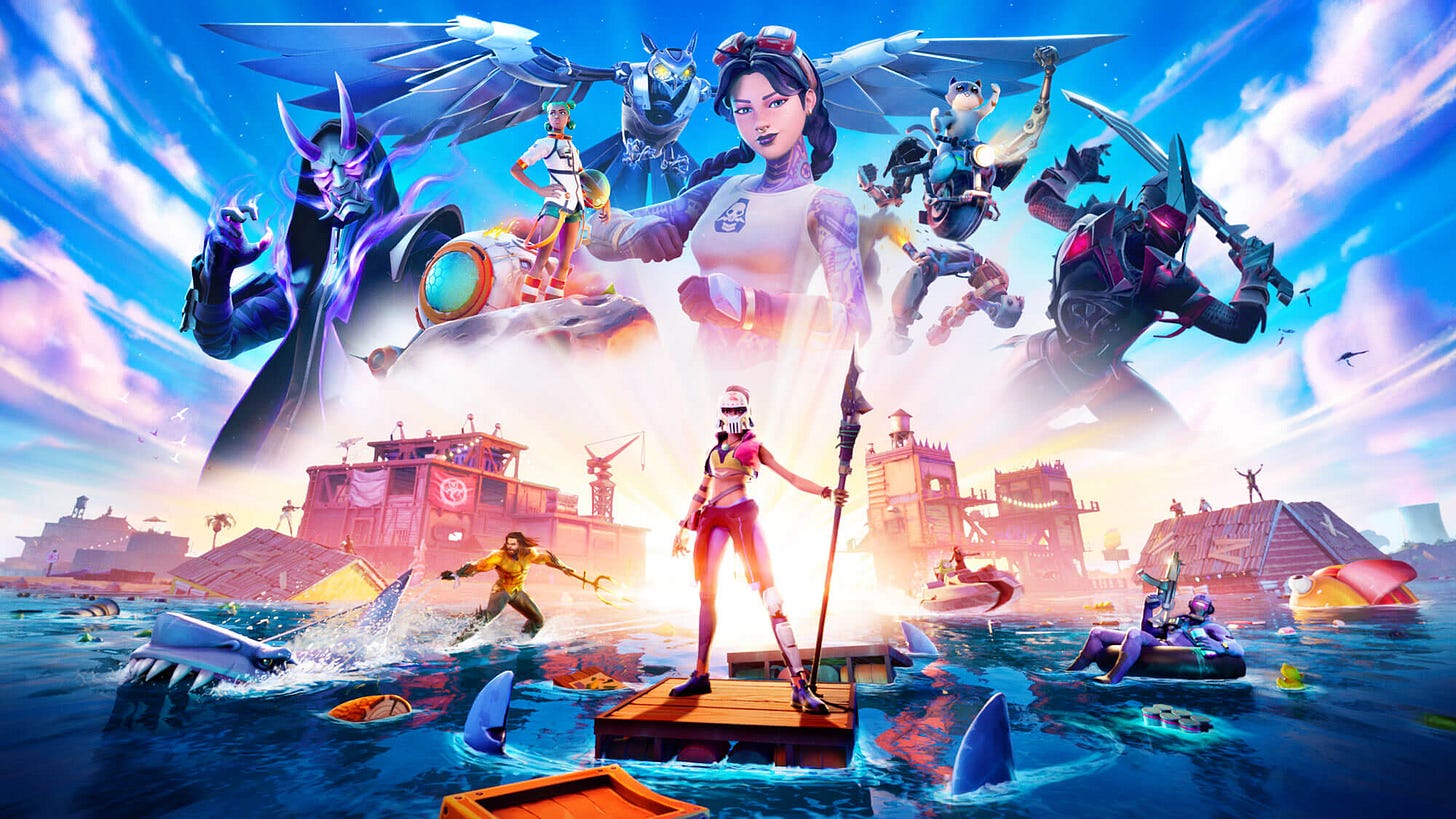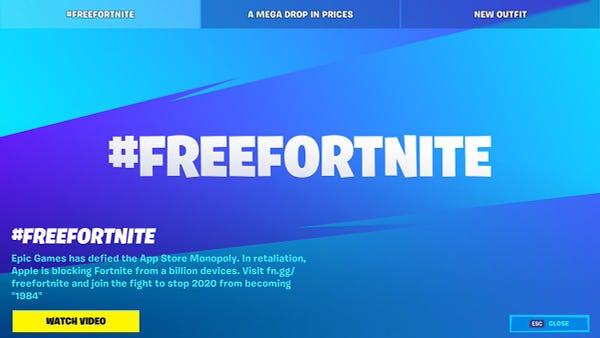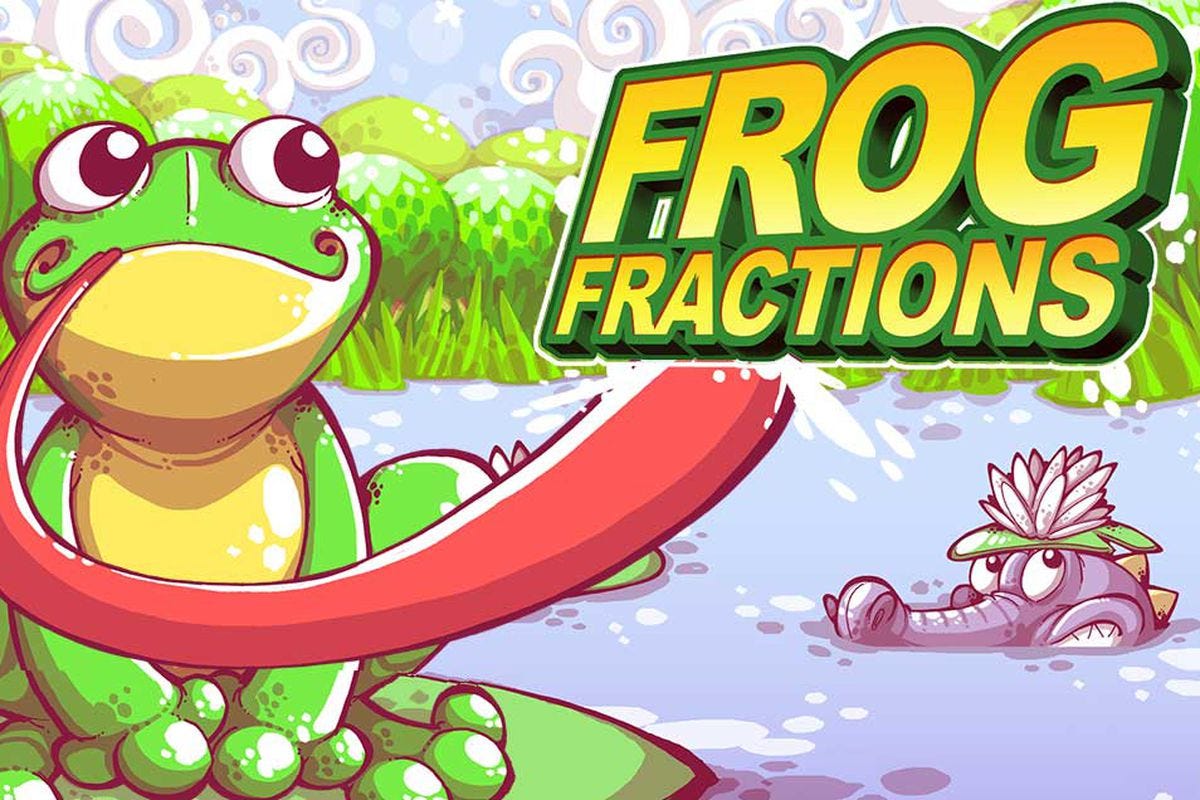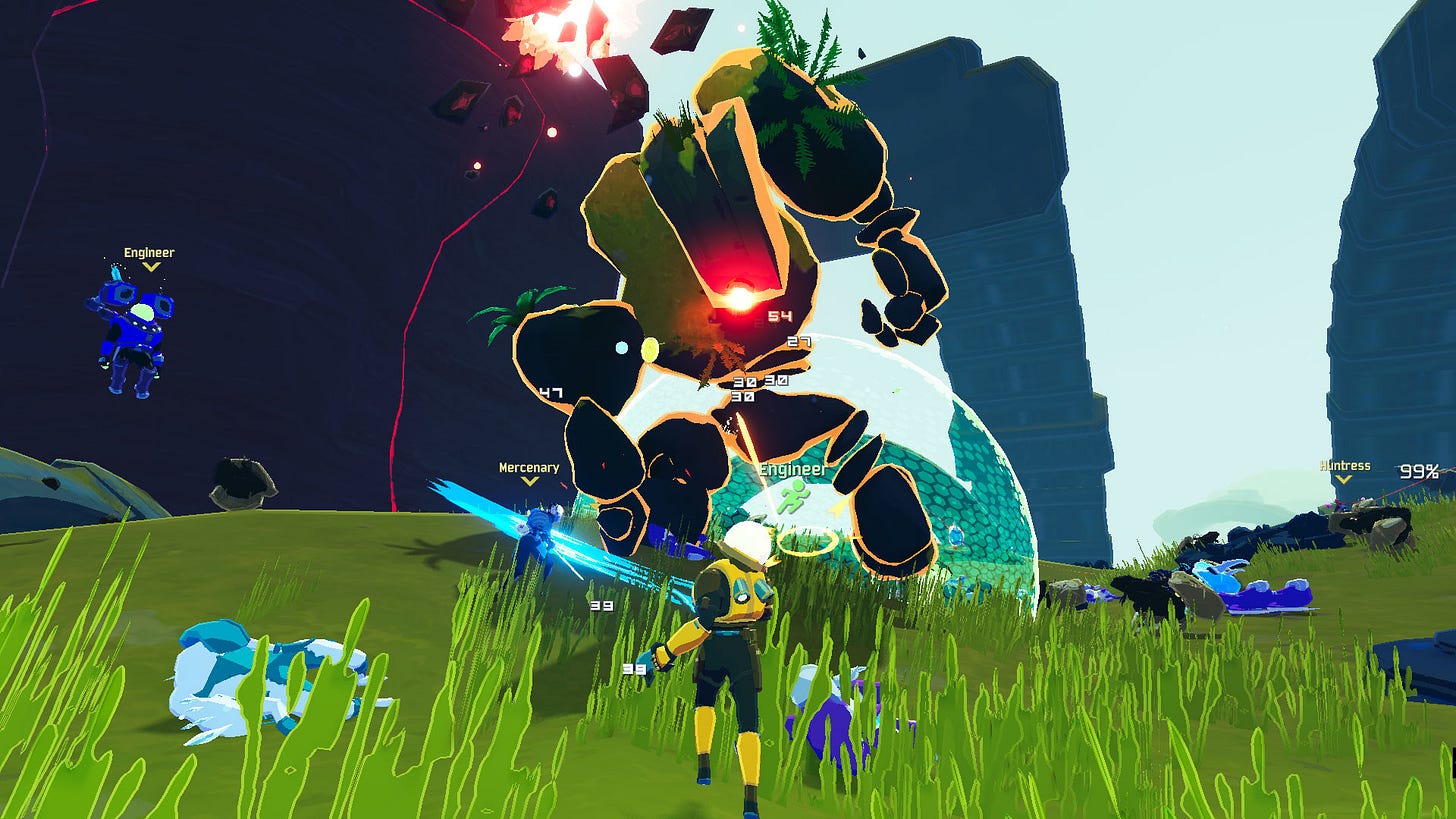Why Fortnite picked a fight with Apple and Google (and why now)
Fortnite cut Apple and now everybody wants a piece
[Hi, I'm Chris Plante, and you're reading Postgame, a weekly newsletter collecting the best games, stories, and videos in the video game community into a fun, digestible package on Wednesday and Sunday mornings. Learn more on the Postgame About page. Postgame is edited by Stephie Grob Plante. If you like the newsletter, please consider subscribing and sharing Postgame with your friends!]

The most significant antitrust lawsuit of the year will come down to V-Bucks. Does anybody have that on their 2020 Chaos Bingo Card?
On Wednesday morning, Epic Games, the creators of Fortnite, the biggest video game on the planet, announced a permanent price drop for certain in-game items and, more notably, its in-game currency, dubbed "V-Bucks."
Fortnite itself is free. Players spend real cash to buy said V-Bucks, then use the virtual currency to purchase virtual cosmetics, like costumes, pickaxes, parachutes, and celebration animations.
The price-drop, while uneventful on its own, was merely the first gear in the Rube Goldberg machine, one trigger firing off the next: a public Twitter bashing, a bizarro parody video, and not one, but two earthshaking lawsuits filed by Epic against Apple and Google.
How did a price adjustment set these shenanigans in motion?
It all boils down to how video games make money in digital marketplaces, and how games creators and marketplaces split the pie.
On PC, Epic has collected every dollar right from its Fortnite player base, who downloads and plays the game through the brand's marketplace, the Epic Games Store. But on mobile devices, Epic has had to deal with an intermediary in the form of Apple or Google, both of whom control distribution onto iOS and Android devices. To play on a mobile device, the player must download Fortnite through the Apple or Google app markets, both of which demand a 30% cut of all in-app sales and a 15% cut of every subscription.
At least that's how things operated until this week.
On Wednesday morning, Fortnite players on iOS and Android were given a new choice within the game. If they wanted a lower price tag, they could purchase the game’s "V-bucks" directly from Epic and get the 20% discount. Or they could continue to purchase "V-Bucks" via Apple and Google's system at the standard price.
Epic was blatantly, almost puckishly breaking Google and Apple’s store policies.
As Epic phrased the decision in its press release:
Currently, when using Apple and Google payment options, Apple and Google collect a 30% fee, and the up to 20% price drop does not apply. If Apple or Google lower their fees on payments in the future, Epic will pass along the savings to you.
Apple in particular doesn't take kindly to companies breaking their policies, which guarantee them lots and lots and lots of money.
In Apple's game of capitalism chicken, even the biggest tech companies have flinched. Most recently, Microsoft nixed plans to launch its video game streaming service, xCloud, on the App Store, with the tech behemoth unwilling to surrender such a substantial cut to its longtime rival. (Earlier this year, Google made a similar decision with it's streaming app, Stadia.) Plenty of iPhone owners griped on Twitter about Apple's onerous policy preventing Xbox fans from playing the xCloud app on their expensive iPhones and iPads. Still, Apple refused to budge and soon enough, the complaints died down.
This is how things have routinely gone in the past! Apple has, to this point, had precedent on its side. Every company that countered Apple has fallen on one side or the other of a Goldilocks dilemma. Some apps were too small and couldn't afford to rock the boat and risk being hurled from the SS Apple. Or they broke the rules and were unceremoniously removed from the App Store with minimal news coverage.
Other services were too big. Platforms like Amazon and Spotify struck odd compromises so that they could co-exist with Apple's inflexible policy without quite breaking it. For example, you can't buy a Kindle book from any Amazon app, but you can buy a Kindle book from Amazon.com on a smartphone browser.


But Epic's porridge… It's just right. The company boasts billions of dollars, a successful distribution platform and marketplace of its own, global investment, and a recent history of upsetting the status quo with the companies that have comfortably controlled the sale, distribution, and invisible boundaries of the industry. As my colleague Patricia Hernandez at Polygon put it, "Fortnite is letting Epic Games break every rule in video games:"
Spending money is a strategy that has worked wonders for them so far. When Steam, Valve’s digital storefront, seemed like an unstoppable monopoly in the realm of PC gaming, Epic Games simply started buying up exclusives and giving away games in droves every week. It didn’t matter that, arguably, the Epic Games Store wasn’t as fleshed out as what Valve offered, or that most of your friends were probably on Steam. Suddenly, not downloading the Epic Games launcher and enjoying its endless goodies seemed like a knuckle-headed move.
Stirring up shit in the video games industry has become Epic's thing. Early in Fortnite's lifecycle, Epic leveraged the game's popularity to break down the walls between video game console multiplayer ecosystems.


If any company has the resources and the guts to go after Apple, it’s Epic.
So Epic picked a fight, and everybody knew what would happen next — and yet, it was still a surprise. Wednesday afternoon, Apple removed the most popular video game on the planet from its App Store. And then came Epic's counter-counter-response, similarly predictable and similarly, and paradoxically, surprising: Epic sued Apple.
Here's Alissa McAloon at Gamasutra on Epic's claims, which expand far beyond the publisher:
Epic is taking aim at Apple’s App Store policies and saying that the anti-competitive attitudes powering them causes “sweeping harms” to developers as a whole by dampening competition, denying devs the ability to choose storefronts or payment processing options, and forcing them to pay a 30 percent revenue “tax” to reach Apple’s millions of iOS users. It argues that many of those same harms impact other platform holders and payment processors by denying both the chance to compete on iOS. This trickles down to iOS users too, argues Epic, by denying consumers choices or any of the benefits healthy store competition on iOS might offer them in terms of app or in-app purchase pricing, for instance.
The lawsuit also clarified that Epic Games "is not seeking monetary compensation from this court for the injuries it has suffered. Nor is Epic seeking favorable treatment for itself."
All of these events on Wednesday, while unusual, were more or less foreseeable once the Rube Goldberg machine sprung into action. We're talking big companies with hulking legal apparatuses that work in predictable ways here. But as the day went on, things got weirder. Way weirder.
Epic's lawyers began their suit with reference to Apple's infamous 1984 commercial. And the document arrived alongside a computer-animated parody of the 1984 ad, which debuted inside of Fortnite.
The video mocks Apple (a giant anthropomorphic apple — a worm lurching from its apple-head) and promotes the #freefortnite hashtag campaign. If you'd prefer not to boot up Fornite, you can watch it on YouTube (above).
Okay, so, deep breath, it's impossible to respond to all of these provocations between Epic and Apple linearly. So let's consider that a few things can be true all at once:
Epic isn't purely altruistic: The publisher runs its storefront to the tune of billions of dollars. It's taking a calculated risk, losing money in the short term to potentially guarantee an even more significant cut of mobile revenue in the long term. Right now, it has no means of opening a storefront on iOS similar to Epic Games Store on PC — surely, it would be interested in such an opportunity.
Epic can be self-interested and still be doing a solid for smaller studios: Apple's walled-garden is notoriously restrictive, and its 30% cut of every purchase in and through the App Store feels increasingly anachronistic. Apple can, of course, do whatever it likes, but a $1.3 trillion company with a restrictive marketplace doesn't look good when Congress is already examining Apple for anticompetitive behavior. If this fight lowers the percentage of money Apple takes from purchases, or, even better, allows for marketplace competition on iOS devices, that's a boon for smaller studios.
Enough with the propaganda: Epic was wrong to create a glorified propaganda ad that will be seen by millions of kids, many of whom are too young to get its reference, let alone understand the intricacies of Epic's legal accusations. It's inexcusable, especially from a brand that existed during GamerGate. As Luke Plunkett wrote at Kotaku, "I would, however, like to give a shout-out to the people responsible for looking back at the last ten years of video game community relations and deciding that 'weaponising a fanbase of angry gamers' was a really healthy and fun thing to do here."
The Apple problem is even bigger than Epic: As I said earlier, Epic is the rare perfect candidate for taking on Apple. Expect to see more brands of all sizes that couldn't start the fight before to swim over now that blood's in the water — and not just companies who rely on the App Store. Nearly every business tied to the internet will be watching this battle anxiously.
Apple's walled garden approach — in which it seeks to control the majority of a user's experience, sometimes to the detriment of other businesses — has been gradually expanding beyond the App Store, impacting an even broader swath of industries that relies on the open internet for distribution.
In his newsletter Processor, my colleague Dieter Bohn wrote about recent tweaks Apple made to Apple News Plus:
… if you’re an Apple News Plus subscriber, clicking links to publications that are part of that subscription bundle will take you to the Apple News app instead of your browser. iOS 14 will do the same thing.
This change is concerning (understandably!) to some folks in the media. Apple might argue this tweak makes for a better experience for the user. The press may contest Apple's intentionally redirecting users away from their publication, and taking ever-shrinking ad revenue with them.
Bohn continues:
There’s the fear that Apple is beginning to compromise user experience in the name of its services revenue. There’s the storyline that Apple actively distrusts the web and would like more activity to happen inside apps than inside browsers. If browsers are used less, that means fewer intrusive ads (win), less tracking (win), and less money for competitors like Google (triple bonus!).
Maybe this isn't a real issue. Perhaps we see smoke, but there's no fire. Yet.
But seeing how the App Store has impacted other businesses with its intense approach to the walled garden, it's concerning.
The press can say similar things about Google, whose search algorithm, ads, and AMP readership control a substantial portion of who sees what online.
Around 7 pm ET on Wednesday, Google booted Fortnite off the Google Play Store. Though the Google Play Store has a slightly more relaxed policy across the service at large, its rules about in-game purchases for an app like Fortnite are clear-cut, and it takes a similar slice of the pie. By 9 pm ET, Epic had announced it would also see Google in court.
(If you’re wondering why I’ve focused on Apple so far, I’m trying not to juggle too many balls at once. Google and Fornite have their own fraught relationship. In short, this isn’t the first time Fortnite has disappeared from the Google Play Store. At The Verge, you can read a brief timeline of the conflicts between Fortnite, Apple, and Google.)
Now the biggest game on the planet is in a showdown with the two biggest tech companies on Earth, who have found themselves embroiled in an investigation from the United States government into antitrust practices. All of this is happening amidst an election, a movement for reform if not total abolition of the US police force, and a global pandemic. How the hell do Apple, Google, and Epic plan to untangle this billion-dollar knot without appearing ghoulishly detached from the people who use their products — folks anxious to know if they’ll be employed, let alone healthy, by the year’s end?
Honestly, at this point, tt’s hard to imagine any of the brands looking great, because the brinksmanship between Apple, Google, and Epic has escalated so quickly. There isn’t an obvious precedent. At Recode, Peter Kafka recounts what happened when Apple sought a portion of Netflix and Spotify's money (for subscriptions, Apple takes a 15% of in-app purchases).
So, over time, some big players, including Netflix and Spotify, have stopped selling subscriptions to their services from the Apple App Store altogether. You can use Spotify and Netflix on Apple devices, but if you want to pay for them, you have to visit those companies’ websites. Spotify has also filed a complaint with European antitrust regulators, who are now investigating Apple’s policies.
But despite those semi-aggressive chess moves, those apps were never booted from the App Store. With Fortnite, Apple took the most severe action, and now it must brace for the most severe reaction, one that Epic Games not only planned for but — going off the language of its lawsuit — seemingly hoped for.
Usually, big companies find a way to compromise, to end these matches in a stalemate. Yet, it's hard to picture any company walking away from this clash happy. Somebody's going to get bloodied.
I agree with Tom Warren's forecast at The Verge:
Epic doesn’t want Apple to pay its way out of a lawsuit or reach a special deal with the company. It wants regulators in Europe and the US to stand up and pay attention.



One last question's been rattling around my brain: Why now?
Deeper in the Recode piece, Kafka includes several recent tweets from Epic CEO Tim Sweeney grousing about the App Store. At the annual DICE conference in January, Sweeney did a keynote on his qualms with the industry's distribution systems and economics. This slow boil reminds me of the period before the Epic Games Store launch when Sweeney made many public, sharp critiques of the Steam marketplace and its 30% cut of digital sales.
Sure, everything happened quickly, but this showdown wasn't something Epic or Sweeney launched willy-nilly. We're witnessing the culmination of an ongoing feud, one hinged on how the video games industry works. With the government's eyes on Google and Apple, preparation met opportunity.
You get the sense that, for at least one person at Epic, this is personal.
Free game of the week
Frog Fractions: Game of the Decade Edition

What is Frog Fractions? I'm so glad you asked. My colleague Allegra Frank wrote an explainer in 2016:
At first blush, Frog Fractions looks like little more than a kid-friendly teaching tool, a math game that abides by some weird amphibian logic […] As an educational game, Frog Fractions proves itself useless pretty fast. It also doesn’t seem to be a great way to pass the time for the older, perpetually bored internet dweller. But surviving the repetitive wave of insects soon unlocks upgrades that ... well, they get weird. Really, really weird.
To say more about Frog Fractions is to spoil Frog Fractions, so I won't say more. Friends, the game is now free on itch.io! Just give it a try and thank me afterward. If you enjoy the game, consider giving a few dollars to the team.
Two games to play

Risk of Rain 2
Developer: Hopoo Games, Publisher: Gearbox Publishing
Risk of Rain 2 has been available in Early Access for quite a while. Still, the official 1.0 release this week sounds like an excellent excuse to revisit the co-operative shooter.
From Wes Fenlon's review at PCGamer:
Risk of Rain 2 nailed all of these things on its first day in Early Access, but since then it's added several characters, and I've enjoyed learning all of them. My favorite of the new batch is the Loader, who's essentially Ripley in her exosuit in Aliens. Loader is all about heavy melee hits, with a charge-up super punch that sends you careening across the map
Risk of Rain 2 is available on Windows, Switch, PS4, and Xbox One.
Parkasaurus
Developer and Publisher: Washbear Studio
I've had this on my to-do list since Fraser Brown wrote a capsule review at Rock, Paper, Shotgun in 2018. This week, the game exited Early Access with an official 1.0 release.
I quickly lost myself in the cycle of hunting for new fossils, creating dinosaur buddies and customising my exhibits. Despite the lack of management wrinkles, there’s was always another dinosaur or tech milestone driving me forward. I spent nearly an hour just tweaking a tiny food court. I wasn’t really concerned about efficiency or profit, just how the park fitted together, and how pretty it looked. Aside from the dinosaurs, Parkasaurus has a lot more in common with Planet Coaster than Jurassic World Evolution.
Parkasaurus is available on Windows.
Three stories to read
A beginner's guide to the best porn games: What to play and what you should know
Jess Joho via Mashable
Jess Joho's guide to porn games is so much more than a list of good porn games. Her reporting gets into the appeal, the ethics, and the potential of the form.
Porn video games come with a lot of stigma, and understandably so. But if you push through all that, you'll find there actually are some really good, very NSFW adult games out there.
It won't surprise you that many of the most popular adult games share similar issues to regular mainstream Tube porn - aggressive heternormativity and a near-exclusive catering to a cis, male gaze. Still, the world of adult sex games is far more expansive, diverse, and varied than people think. And, finding the right erotic game for you can help open you up to new aspects of your sexuality you'd never thought about before.
Meet the Resident Evil superfan who's spent a decade putting together a 2700-page timeline of the entire series
Wesley Yin-Poole via Eurogamer
One of those great stories I didn’t know I needed.
I've spent the last few weeks lurking in a Discord called The Resident Evil Podcast, a channel dedicated to discussion of Resident Evil lore. It is a vibrant community, packed with debate about Capcom's sprawling horror series. The people in it really, really care about Resident Evil, and co-founder TheBatMan is revered. Every now and then you see posts from people debating some contentious issue in the lore, and someone steps in to say, well, let's wait and see what TheBatMan has to say about that.
And so they should, because TheBatMan has created perhaps the most complete and in-depth fan project ever conceived: a 2700-page long document, a decade in the making, that details the entire mythology of the Resident Evil series.
Welcome to Kill It With Fire, a Tiny Immersive Sim about Hunting Spiders
Danielle Riendeau via Fanbyte
Kill It With Fire starts small but just keeps growing, like the dinosaur sponges you can buy at the dollar store. Here's Danielle Riendeau on this lovable game:
there’s a delicious little taste of the immersive sim in here, in its robust physics engine (you can pick up and throw anything not nailed down!), its impressively bizarre fire and explosion physics, and even in its reverse-stealth enemy structure. Hell, there are even upgrade trees and new weapons and an appreciable number of secrets to look for in its levels.
Three videos to watch
How Prey's mind-bending opening level was designed
noclip via YouTube
Microsoft Flight Simulator: A History
Microsoft Flight Simulator via YouTube
In the words of Rami Ismail: "Computers evolved kinda fast, didn't they?"
The Gamecube intro… just the Gamecube intro
pope7 via YouTube
The best of the rest
In Singapore, free expression in games has become a lightning rod issue. (USGamer)
Wedbush analyst Michael Pachter explains the origins of Apple's "30%" cut. (Twitter)
Can Epic actually win against Apple and Google? Nicole Carpenter got experts to weigh in. (Polygon)
Brave current and former Ubisoft employees continue to share allegations of abuse and misconduct at the company. At Kotaku, Ethan Gach and Ash Parrish report on the #MeToo reckoning within the publisher, and Chris Kerr has published a new report at Gamasutra.
A beautiful piece by Vivian Chan and Yussef Cole on writing, editing, and sharing. (Unwinnable)
Kyle Orland explains why Epic's battle for "open platforms" ignores consoles' massive closed market. (ArsTechnica)
And Patricia Hernandez argues that we shouldn't be so skeptical about Epic's lawsuits and what they could mean for 'the little guy.' (Polygon)
Ephemera
Sufjan Steven's new music video: "Video Game"
Sufjan Stevens via YouTube
That's a wrap. Have a wonderful week. Wear a mask. I'll see y'all Wednesday morning!
But what do you think?
Send links, tips, comments, questions, games, and cheeky court documents to @plante.




Hey! Great read. I was curious about this: "for subscriptions, Apple takes a 15% of in-app purchases"
From what I understand, Apple actually takes 30% in the first year a user is subscribed, and 15% after that. Did this change?